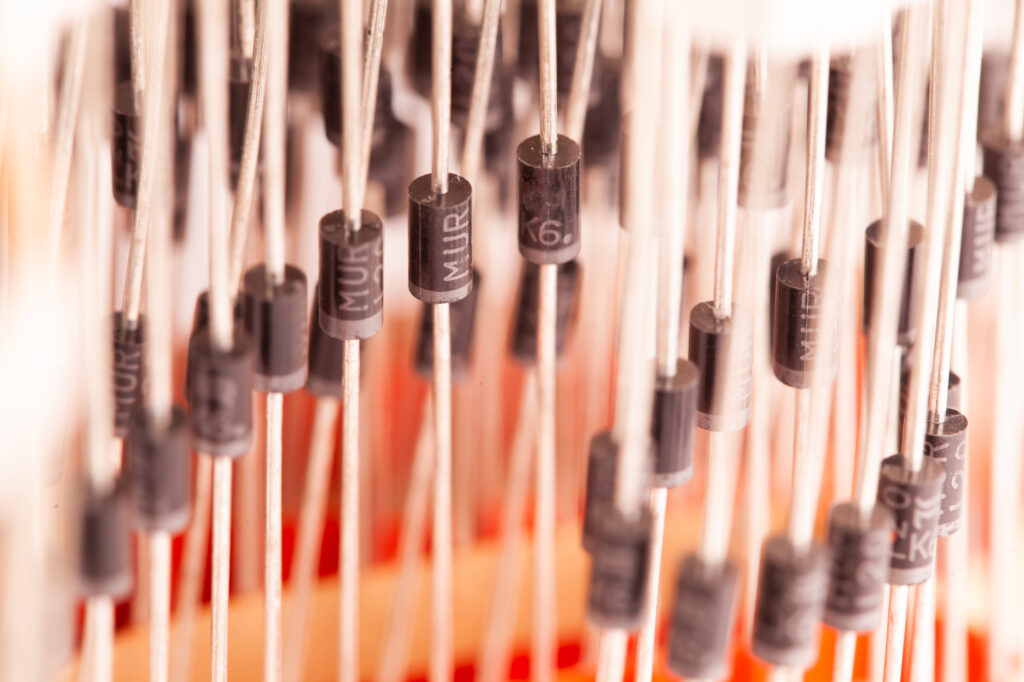Diodes
Understanding Diodes: Types and Applications in Electronic Circuits
Diodes are essential electronic components that play a crucial role in controlling the flow of electrical current within circuits. They provide a one-way path for current, allowing it to flow in one direction while blocking it in the opposite direction. This article explores the different types of diodes and their applications in electronic circuits.
- Understanding Diodes:
A diode is a two-terminal device made from semiconductor materials, typically doped silicon or germanium. It consists of a P-N junction, where P represents the positively doped region (anode) and N represents the negatively doped region (cathode). The behavior of diodes is governed by their forward bias and reverse bias characteristics. - Types of Diodes:
a) Rectifier Diodes: Rectifier diodes, such as the standard PN junction diodes, are the most common type. They are used to convert alternating current (AC) to direct current (DC) by allowing current flow in one direction during the positive half-cycle and blocking it during the negative half-cycle.
b) Zener Diodes: Zener diodes are designed to operate in the reverse breakdown region, maintaining a constant voltage across the diode. They are primarily used for voltage regulation, voltage reference, and protection against voltage spikes.
c) Light-Emitting Diodes (LEDs): LEDs are diodes that emit light when forward biased. They are widely used for display purposes, indicator lights, and lighting applications. LEDs are available in various colors and can produce light with high efficiency.
d) Schottky Diodes: Schottky diodes are characterized by their low forward voltage drop and fast switching capabilities. They are commonly used in high-frequency applications, rectifiers, and voltage clamping circuits.
e) Varactor Diodes: Varactor diodes, also known as varicap diodes, are designed to act as voltage-variable capacitors. They find applications in voltage-controlled oscillators (VCOs), frequency synthesizers, and tunable radio frequency (RF) circuits.
f) Tunnel Diodes: Tunnel diodes exhibit a unique negative resistance region, allowing them to operate at high frequencies. They are used in applications such as oscillators, amplifiers, and switching circuits that require high-speed performance.
- Diode Applications in Electronic Circuits
a) Rectification: Diodes are commonly used as rectifiers to convert AC to DC, providing a steady and controlled power supply for various electronic devices.
b) Voltage Regulation: Zener diodes are employed for voltage regulation, maintaining a constant voltage level despite changes in input voltage or load variations.
c) Protection: Diodes are used for protection against voltage spikes and reverse current flow, safeguarding sensitive electronic components from damage.
d) Signal Modulation and Detection: Diodes are utilized in amplitude modulation (AM) and frequency modulation (FM) circuits for signal modulation and demodulation.
e) Logic Gates: Diodes, along with other components, are used to construct logic gates in digital circuits, enabling complex logical operations and digital signal processing.
f) Power Supply Filtering: Diodes are employed in conjunction with capacitors to filter out high-frequency noise and stabilize power supply voltages.
g) Lighting and Display: LEDs are extensively used for lighting applications, display panels, and indicator lights in a wide range of electronic devices.
Diodes are versatile electronic components with various types and applications in electronic circuits. From rectification and voltage regulation to protection, modulation, and digital logic operations, diodes are integral to the functionality and reliability of electronic systems. Understanding the different types of diodes and their unique characteristics enables engineers and designers to select the appropriate diode for specific applications, ensuring optimal performance and efficiency in modern electronic devices

